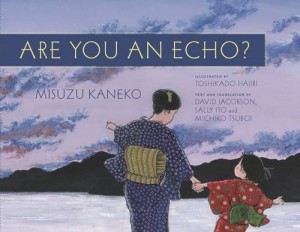JQ Magazine: Book Review — ‘Are You an Echo?’

“This is an outstanding collection of poems that reflects a wide variety of emotions and observations while giving readers new and colorful images of Japan.” (Chin Music Press)
By Rashaad Jorden (Yamagata-ken, 2008-10) for JQ magazine. A former head of the JETAA Philadelphia Sub-Chapter, Rashaad is a graduate of Leeds Beckett University with a master’s degree in responsible tourism management. For more on his life abroad and enthusiasm for taiko drumming, visit his blog at www.gettingpounded.wordpress.com.
As we might take for granted the ability to research anything and everything quickly, it’s easy to forget how much of a struggle it has been (and still might be) to discover fascinating aspects of history. But when those discoveries are made, it’s satisfying not just for those who make the extensive effort—it’s rewarding for those who have benefited from the discoveries.
Thanks to fellow author Setsuo Yazaki, English-language speakers from all over the world now have the opportunity to read Are You an Echo? The Last Poetry of Misuzu Kaneko, a collection of poems produced by the late lauded children’s writer. Yazaki was a young student when he read Misuzu’s poem “Big Catch,” and he was automatically intrigued by her. So he wanted to discover more of her works and immediately started trying to find them—only to run into run one obstacle after another. Finally, Setsuo made a breakthrough when he was able to reach Misuzu’s younger brother Masasuke (then 77 years of age), who handed Yazaki a set of diaries, which included poems Misuzu wrote.
A prolific writer, Misuzu’s works regularly appeared in popular magazines. She wrote 512 poems, but only a few of them appear in Are You an Echo? Even so, that small sample size is enough to give you a glimpse into her life. Misuzu grew up in a fishing village in western Japan, and she loved being around water (she wrote one poem about an island she visualized but couldn’t reach). She also had a very vibrant imagination, and everything she encountered had feelings, like snowflakes (she’s actually concerned about their well-being) or telephone poles (which at one point, got sleepy). Even cicadas wore clothes in Misuzu’s world.
But like many people, Misuzu experienced significant unhappiness in her life and somewhat surprisingly, those dark periods of her life are addressed in Are You an Echo? by David Jacobson, the book’s author of sorts (he composed its narrative, which comprises the first half of the book). Jacobson doesn’t shy away from telling the story of her unhappy marriage, illness and untimely death by suicide. As Are You an Echo? is in part an abridged biography of Misuzu, it is necessary to provide context on why, for example, her output as a writer diminished. It is surprising that Jacobson tackles dark themes like the struggles of Misuzu’s life in a book geared toward children; in the author’s note appearing at the end of the book, he explained why he did so. Jacobson describes Are You an Echo? as a mashup of a biography and a book of poetry and to omit the information about the dark tales of her life would not have told the complete story about Misuzu. In addition, readers get an idea why Misuzu’s poems seemed a bit gloomy.
Those who unfamiliar with Misuzu might wonder if her work is relevant in modern day Japan. Fortunately, Jacobson provides the answer while telling a story of events in the aftermath of the 2011 Tohoku earthquake and tsunami: A public service announcement aired on Japanese TV that included the poem “Are You an Echo?” and the words seems comforting to millions of Japanese as the poem reassured people they were not alone as well as introducing her to legions of new readers.
Are You an Echo? is a very easy read. It’s geared towards younger readers so there are plenty of illustrations, and the second half of the book is largely devoted to Misuzu’s works. The true highlight of Are You an Echo? is the way Toshikado Hajiri‘s visuals masterfully bring early 20th century Japan to life. The splendid illustrations generally complement the poems very well, such as “Waves” appearing on a page featuring an illustration of waves crashing into the sand (although it’s rather doubtful fireworks were used to ring in January 1 around the time Misuzu wrote a poem about New Year’s Day).
The book is also a great educational tool for Japanese-language learners as most of the poems appear in both English and Japanese. You might think translating Misuzu’s poems from Japanese into English was simple. Not at all—translating the poems in Are You an Echo? was an arduous task that required the work of two translators who produced several versions of translations for each poem before settling on a suitable one. In fact, the steps they took to present the poems in fluid English is outlined in the “Translators’ Note” at the end of book.
Indeed, the above-mentioned collaboration is another example of how without the hard work of so many, Are You an Echo? might never have seen the light of day—and how Japan might not have received some comforting words in their time of great need. This is an outstanding collection of poems that reflects a wide variety of emotions and observations while giving readers new and colorful images of Japan.
For more on Are You an Echo?, click here. For more JQ magazine book reviews, click here.


Comments are closed.